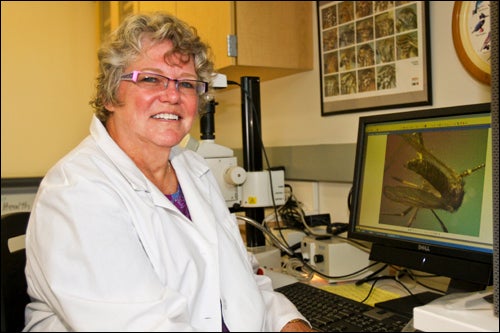‘Skeeters’: They’re big. They’re biting.
In eastern North Carolina, they’re most likely called “Skeeters,” but regardless of the name, mosquito populations surge after rains like those brought by Hurricane Irene and the rain expected to hit the area this week. ECU environmental health sciences professor Alice Anderson in the College of Health and Human Performance is an expert on mosquito control and diseases. Below she addresses some common issues related to the pests.
- What do you recommend as a repellent for people to use while outdoors? I recommend any product with DEET in it. Children should use DEET products with less than 30% active ingredient. There are a few others that are helpful, but for an outdoor job or event, DEET products are the standard.
- Have cases of mosquito-borne diseases increased since Hurricane Irene?
In North Carolina there have been no cases that we know of in humans this year; however, there is no one keeping surveillance records since the state reorganized some departments and dissolved the Public Health Pest Management Section. The state health department records human cases, but none have been reported to my knowledge. Veterinary cases, which sometimes preceed human cases, are reported to the NCDA, but I have not heard anything in that regard this year. There was a human case of EEE in Virginia since the hurricane.
- How long does “mosquito season” typically last? Mosquito season in N.C. lasts until late January. Activity is reduced after continuous temperatures below 50 Degrees F, but many mosquitoes can resume biting if the daytime temperatures rise above that.
- Is it too late in the season for larvicide spraying to have a large impact now? Larvaciding can continue all year. There are products that can be placed in wetland areas during the winter that only become activated when there is a thaw of water (90+ day Briquettes) and others that are for shorter term placement. The key to larvaciding is finding where the mosquitoes breed. Surveillance and mapping are critical so that larvacides can be placed in locations that have a record of breeding. Mosquito control professionals use dippers to continually test wet areas throughout the year so that they can map the breeding areas. Ditches that breed can be treated with 30-day briquettes, or a ditch can be treated right after a flooding rain with granular larvacide. There are many options in a professional larvaciding operation.
- What tips do you recommend to minimize the backyard from becoming a breeding ground for mosquitoes? Backyards must be CAREFULLY inspected to locate even the smallest water holding objects. For example, tires are great breeders. Even clogged gutters on houses, tree holes high in trees, a plastic teaspoon, a plastic shutter resting on the ground, can breed mosquitoes in 5-6 days during warm rainy weather. Some communities in other states have inspectors who can go on citizen’s property and inspect for these breeding sites, helping owners to eliminate them. In NC this is not allowed, but owners can “tip and toss” EVERYTHING. Saving rainwater in barrels is a good conservation move, but a SCREEN must be tight and placed on top to keep the barrel from being a mega-breeding site.There is a good site for backyard education on the North Carolina Mosquito and Vector Control Association Website. http://www.ncmvca.org/There is also a great educational game site called “Spot the bloodsuckers” at http://archive.peabody.yale.edu/explore/spot-the-bloodsuckers/index.html
